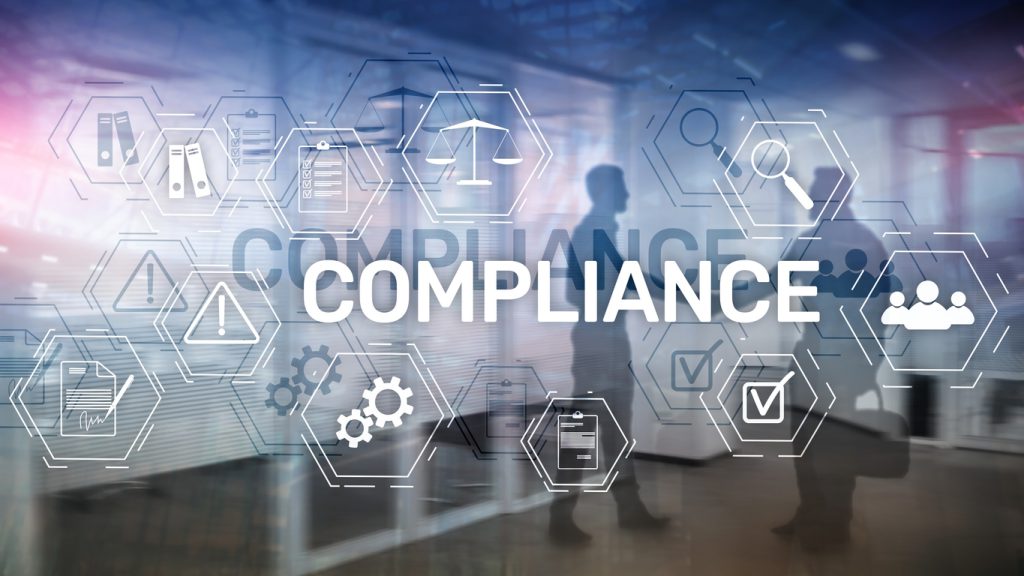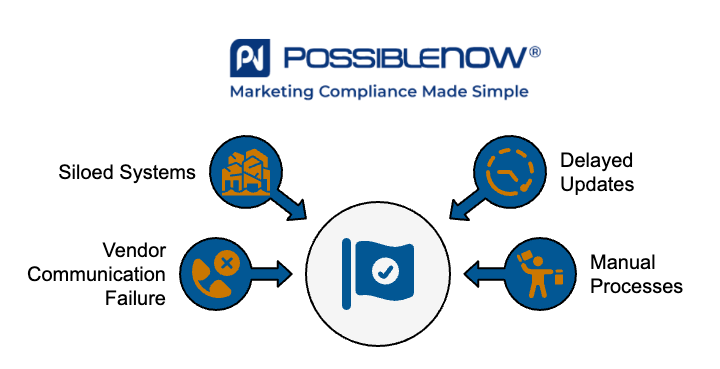Resource Center
How to Monitor DNC Compliance Across Multiple Channels
Type: Blog
Topic: Do Not Call Solution

Managing Do Not Contact (DNC) compliance across multiple channels like voice, SMS, email, and direct mail is challenging for large organizations. Each channel is governed by different regulations and often managed by separate teams or platforms. Without clear coordination, it’s easy for opt-outs to be missed or applied inconsistently.
To reduce risk and maintain trust, businesses need consistent, cross-channel compliance practices. Here are key ways to monitor DNC compliance effectively:
- Centralize DNC and consent data across departments and vendors
- Automate list scrubbing and real-time suppression
- Monitor activity with alerts and audit reports
- Provide regular training to staff and vendors
- Use integrated consent management across communication systems
In the following sections, you’ll find information on:
- Key Steps to Stay on Top of Multi-Channel DNC Compliance
- What Rules Govern Which Channels?
- Common Mistakes That Undermine DNC Compliance
- Vendor Oversight and Shared Responsibility
- Strengthen Compliance with Enterprise-Grade DNC Solutions
- About PossibleNOW
Speak With an Expert Today
Key Steps to Stay on Top of Multi-Channel DNC Compliance
1. Centralized DNC Management
Managing DNC compliance in silos creates risk. Instead, use a unified database that consolidates federal, state, and internal DNC lists. This system should be accessible to all departments and any third-party vendors involved in outbound communications, allowing for consistent application of suppression rules.
2. Automated List Scrubbing
Manually scrubbing call and contact lists is slow and error-prone. Automated DNC tools help scrub your lists in real time across channels—voice, SMS, email—reducing the chances of unauthorized outreach and helping teams stay within regulatory timeframes.
3. Real-Time Monitoring and Reporting
Look for systems that flag potential compliance violations as they happen. Real-time alerts, dashboards, and activity logs enable teams to respond quickly to issues before they escalate or lead to regulatory scrutiny.
4. Regular Compliance Audits
Compliance programs can drift out of alignment over time—especially after internal system changes or M&A activity. Audits help you assess the effectiveness of suppression workflows, spot integration issues, and verify vendor adherence.
5. Employee Training and Awareness
Front-line teams, including marketing, sales, customer service, and IT, should be regularly trained on DNC-related regulations and internal procedures. This helps prevent accidental violations and builds internal accountability.
6. Integrated Consent Management
Consent data should not live in a vacuum. Use systems that update opt-in and opt-out preferences across all platforms where customer data is stored. This reduces the likelihood of conflicting permissions and unauthorized outreach.
What Rules Govern Which Channels?
Each communication channel is subject to its own set of legal requirements:
- Phone and SMS: Governed by the Telephone Consumer Protection Act (TCPA) and Telemarketing Sales Rule (TSR). Businesses must obtain express written consent for certain types of calls and texts and must suppress numbers listed on federal and state DNC registries.
- Email: Regulated under the CAN-SPAM Act, which requires opt-out mechanisms, accurate sender information, and prompt suppression of unsubscribe requests.
- Direct Mail: State-specific Do Not Mail databases and consumer opt-out preferences may apply. While federal oversight is lighter here, organizations still face reputational risks if they ignore direct mail opt-outs.
Common Mistakes That Undermine DNC Compliance

Even organizations with good intentions can be vulnerable to common compliance missteps, including:
- Using siloed systems that don’t share DNC status across departments
- Delaying suppression updates after a customer opts out
- Failing to update third-party vendors when permissions change
- Relying too heavily on manual processes without auditing their effectiveness
Over time, these issues can lead to accidental violations, customer complaints, or regulatory penalties.
Vendor Oversight and Shared Responsibility
Vendors that conduct outreach on your behalf must follow the same rules your internal teams do. Without clear oversight, they can become a weak link in your compliance program.
Key actions to take include:
- Including DNC compliance clauses in vendor contracts
- Requiring use of centralized suppression lists
- Providing secure, real-time access to DNC updates
- Monitoring vendor activity with audit trails and performance reviews
Shared access to a unified DNC platform can make coordination more efficient and reliable.
Strengthen Compliance with Enterprise-Grade DNC Solutions
Manual tracking and list suppression don’t scale in today’s multi-channel world. That’s why enterprise organizations are turning to automated platforms like DNCSolution® to monitor compliance across voice, SMS, email, and more.
A robust Do Not Contact solution helps by:
- Managing suppression lists across all outbound channels
- Scrubbing in real time before messages are sent
- Logging all activity for audit readiness
- Integrating with CRMs, dialers, and messaging platforms
If your organization needs better visibility and control over multi-channel outreach, schedule a consultation or demo of DNCSolution® to learn how we can help.
Request a Demo Today
About PossibleNOW
PossibleNOW is the pioneer and leader in customer consent, preference, and regulatory compliance solutions. We leverage our MyPreferences technology, processes, and services to enable relevant, trusted, and compliant customer interactions. Our platform empowers the collection, centralization, and distribution of customer communication consent and preferences across the
enterprise. DNCSolution addresses Do Not Contact regulations such as TCPA, CAN-SPAM and CASL, allowing companies to adhere to DNC requirements, backed by our 100% compliance guarantee.
PossibleNOW’s strategic consultants take a holistic approach, leveraging years of experience when creating strategic roadmaps, planning technology deployments, and designing customer interfaces. PossibleNOW is purpose-built to help large, complex organizations improve customer experiences and loyalty while mitigating compliance risk.
-
TCPA Regulations and Compliance: Complete Guide
Type: Blog
Topic: Do Not Call Solution
-
Defining Meaningful Metrics: 6 Soft KPIs to Measure Customer Preference Collection
Type: Blog
Topic: Preference Mgmt
-
Email Preference Center Best Practices
Type: Blog
Topic: Preference Mgmt
-
The Basics of DNC Scrubbing: What Is a Do Not Call (DNC) Scrubber and Why Do You Need It?
Type: Blog
Topic: Do Not Call Solution
-
What is Consent Management, How it Works, & Why it’s Important for Data Compliance
Type: Blog
Topic: Consent Mgmt
-
Do Insurance Companies Cover TCPA Damages?
Type: Blog
Topic: Do Not Call Solution
-
8 Best Practices for Capturing GDPR Consent
Type: Webinars
-
Data Silos Cause Communication Gaps
Type: Videos
Topic: Preference Mgmt
-
Difference Between Preferences & Consent
Type: Videos
Topic: Preference Mgmt
-
Integrate Do Not Call Compliance with Preferences
Type: Videos
Topic: Preference Mgmt
-
Customer Preferences Require More Than One Flavor
Type: Videos
Topic: Preference Mgmt
-
Give Customers Opt-Down Options
Type: Videos
Topic: Preference Mgmt
-
Preference Center Organization
Type: Videos
Topic: Preference Mgmt
-
Strategic Consultants Benefited Scotiabank
Type: Videos
Topic: Industry Testimonials
-
Best Practices for Managing Do Not Email Lists
Type: Blog
Topic: Do Not Call Solution
-
How Do Not Call Rules Apply to Nonprofit Organizations
Type: Blog
Topic: Do Not Call Solution
-
How to Train Your Call Center on DNC Rules
Type: Blog
Topic: Do Not Call Solution
